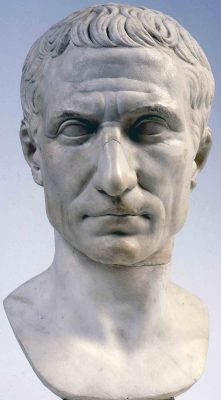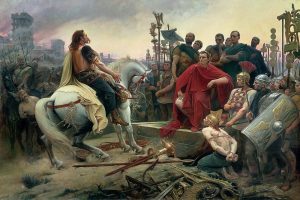Gaius Julius Caesar was a Roman statesman who was best known for being a part of the First Triumvirate with Gnaeus Pompeius Magnus and Marcus Licinius Crassus and for his roles as the dictator and emperor after the end of the triumvirate.
Early Military Career
In 81 BC, at around 22 years of age, Julius Caesar became a part of the Roman army. Two years later, in 79 BC, Caesar was able to serve as staff for a military legate and saved a person’s life. He was given a civic crown of oak leaves as his award.
He was deployed by his general on a mission to Nicomedes, who was the king of Bithynia; Caesar was sent to negotiate with him in order to acquire a fleet of ships. Caesar was successful, which positively impacted his military career. Still, he was also the subject of rumors about his possible homosexuality, which he allegedly used to convince Nicomedes to provide ships. After many years of service, in 72 BC, Caesar was elected to be a military tribune.
Governor of Gaul
In 58 BC, Julius Caesar was appointed as the governor of Gaul. He stayed in Gaul for the next eight years. In need of territory and money, Caesar was able to lead the four legions in the area. There were two provinces in Gaul that were nearby unconquered territory, and Caesar had the means to conquer those places.
In one area, Rome’s ally, the Aedui tribe, was on the verge of being defeated in the Battle of Magetobriga against the Sequani and Arverni tribes. The Sequani and Arverni tribes had the support of the Germanic Suebi tribe, who were commanded by their king, Ariovistus.
The Aedui requested help from Julius Caesar through Diviciacus, an Aeduan politician and druid. They needed Rome’s legions to defeat Ariovistus, who had not only massacred the Aedui but were now claiming a good portion of Sequani land after helping the tribe. The Romans feared that Ariovistus would then have the leverage to take over the whole of Gaul. Once Diviciacus had pleaded with Caesar, the governor was able to use this request to appear as a “savior” instead of a “conqueror.” After that, the Romans triumphed over Ariovistus during the Battle of Vosges. The Germani surrendered and retreated to the Rhine. Consequently, Caesar was able to gain control of the entire Gaul territory.
Caesar’s time in Gaul was spent on military conquests as, at his command, Rome was able to conquer entire modern France and Belgium. Rome was thus able to free of pressure from Gallic invasions. In 55 BC and then in 54 BC, Caesar was also able to complete expeditions to Britain.
Civil War
The alliance of the prominent politicians Crassus, Pompey, and Caesar called the First Triumvirate was slowly breaking down in 54 BC. Julia, Caesar’s daughter, and Pompey’s wife had died in that same year, weakening their alliance. In 53 BC, Crassus died after battling the Parthians, which also put a strain on Caesar and Pompey’s relationship. The triumvirate disbanded. The following year there was a huge riot in Rome which pushed Pompey to be given the position as the sole consul. Pompey moved to the side of the Optimates, the political group that favored the wealthy aristocrats and the Senate.
Caesar went back to Italy and marched to Rome, crossing the Rubicon river without ceasing his control over his army. A civil war broke out, and Caesar’s soldiers were victorious against Pompey. Pompey escaped to Egypt in search of refuge upon losing the battle. Instead, he was assassinated in the Egyptian pharaoh Ptolemy XIII’s bid to win over Caesar.
Caesar went on to become the ruler of Rome, proclaiming himself to be the sole consul and dictator.
Consul and Dictator
After receiving news of Pompey’s death in Egypt, Caesar commanded that the Egyptians give recompense for Rome’s military assistance during Ptolemy XII’s reign. He also negotiated the civil war between the Egyptian co-rulers of that time, Ptolemy XIII, and Cleopatra VII. Cleopatra VII not only became his lover but also asked for the help of his Roman army to defeat Ptolemy XIII, her brother, husband, and co-ruler. Caesar’s military support eventually resulted in Cleopatra’s victory.
Caesar left Alexandria and went back to Rome in October 47 BC. He aimed to venture to Africa with his legions in order to battle the Optimates, but they rejected the idea. Caesar was eventually able to convince them to travel to Africa. Despite the challenging battles that took place, Caesar and his troops were able to defeat the opposition in Thapsus. In 46 BC, Caesar arrived back home and celebrated his victories over various groups over the years: the Gauls, Egyptians, Juba, and Pharnaces.
Caesar’s life ended in 44 BC when he was assassinated while in a meeting with the Senate.

